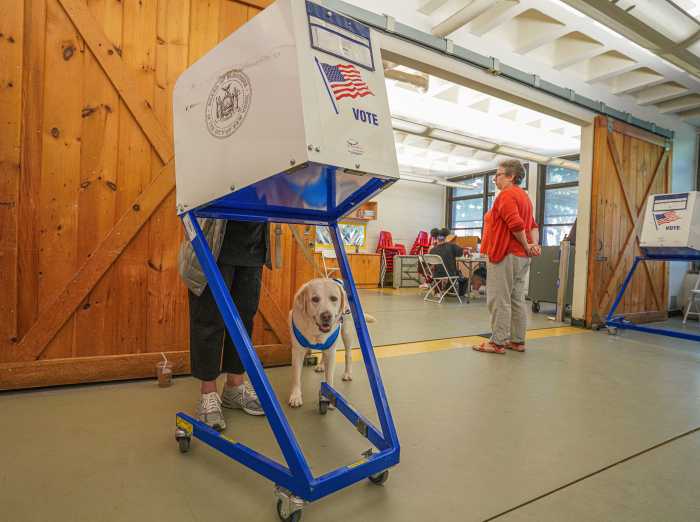By Helen Klein
With just days to go in the legislative session, New York State lawmakers are taking up an expanded version of Billy’s Law, in an effort to strengthen protections for children who are sent out-of-state for educational, rehabilitative and other placements. Last year, the state came close to putting into effect a law that would have regulated out-of-state placements for developmentally disabled youngsters, creating a mechanism for regular oversight of facilities that accepted these children, as well as a registry of state-approved placement sites. However, six months after the legislation was passed overwhelmingly by both the State Senate and the Assembly, Governor George Pataki vetoed it, last December, requesting that a task force, the Interagency Work Group on Out-of-State Residential Placements, study the issue and make recommendations. The new, considerably broader legislation that has resulted is sponsored by two Brooklynites: State Senator Marty Golden and Assemblymember Joan Millman. It weighs in on a wide range of currently unregulated matters, mandating oversight over both quality of care and financial matters, and enlarges its scope beyond the agencies who deal with out-of-state placement of developmentally disabled children to include all agencies which place children in facilities out of state. Bringing Agencies Together Among the legislation’s goals is improving communication between the various agencies involved with placement of children in out-of-state facilities, in part by mandating the creation of an out-of-state placement committee whose members would be the state commissioners of the various agencies involved with the placements. The legislation also requires that the committee develop parameters for use by each agency in writing contracts, as well as “model processes for placement,” and that each agency create a registry of approved programs, coming up with a set of requirements for all facilities on the registry. Among the requirements would be that the facilities where New York children are placed be inspected on a regular basis by a member of the placement committee. In addition, the facilities would have to be licensed by the appropriate state agency of the state in which they are located, and that state would have to have laws and regulations regarding “investigation and resolution of allegations of abuse or neglect.” Also, the legislation would mandate that, “The types of care being provided” be “consistent with New York law and the applicable committee member agency’s regulations.” Thus, a state to which a New York child is sent could not allow electric shock, which is prohibited in New York. The legislation would also mandate “integrated funding,” whereby the money would, “Follow the child into the most appropriate and least restrictive placement.” Vote Imminent The legislation is expected to be voted upon before the current session ends, and may well have been voted upon by the time this paper is printed. If this occurs, it will have been written and passed in arguably record time, just a matter of a couple of weeks from the time the task force issued its report on June 1st. The task force’s recommendations addressed not only quality-of-care issues arising from limited oversight and control by New York State agencies, but also, “The economic impact and job losses that result from exporting dollars and jobs to other states.” The task force also documented, “The aggressive marketing efforts of certain out-of-state providers to local departments of social services, local educational agencies, parents and parent organizations, and if this may be inappropriately influencing the local decision-making processes.” Finally, the report examined, “The geographic and regional disparities in service delivery and placement patterns.” According to the report issued by the task force, “The Work Group acknowledges that, in some cases, out-of-state residential placements for New York children may sometimes be the best available alternative, or in some cases, the only known option to meet the needs of individual disabled children. However, the Work Group’s philosophy is that each New York State child should receive the most appropriate community based services that will support a child’s ability to remain in his or her own home, or be placed in the least restrictive setting that will address his or her individual needs.” Goals Enunciated To that end, the first goal enunciated by the task force is, “To enhance or improve access to the statewide systems of care to provide for children with complex or multiply-diagnosed needs; increase and strengthen prevention and residential services; and prevent, where possible, the placement of children out-of-state.” Another goal of the task force is, “To strengthen the state’s capacity and resources in order to provide opportunities to maintain children in New York State in the least restrictive setting available that can address their complex needs.” “The object of the game,” stressed Golden, “is to bring the kids home. That’s what this legislation is going to do. We are not going to leave kids in facilities outside the state that don’t conform to the regulations of the city and the state. We are going to make sure they get the care they are entitled to. We are not happy with children being mistreated and abused outside the state of New York.” The bill that emerged after six months of study and investigation, said Bob Herz, a Golden staffer, is “much stronger legislation. There’s an awful lot more in it,” he explained. “Last year, we wanted regulation under the State Education Department of approved programs with certain criteria.” The new bill, however, involves, “All the agencies that have anything to do with placing a child out of state,” Herz explained, listing the various areas the legislation has targeted. In addition, Herz said, the legislation also requires, “An annual progress report as this all goes forward.” Looking Ahead Herz said that he was confident that Pataki would sign the legislation, once it passes, into law. Why? “We are working off of findings,” he explained. In contrast, Herz said, the previous legislation was based on “anecdotal evidence, but we didn’t have the whole system pinned down. The governor put a lot of time and resources into making this thing work.” If it works, the first person to applaud its success is likely to be Billy Albanese, after whom the original “Billy’s Law” was named. Billy was physically and emotionally scarred by his experiences at out-of-state facilities inadequately monitored by New York State and where he was subjected, as his father has painstakingly documented, to neglect and abuse. Golden frankly credits Vito Albanese, Billy’s father, for having tenaciously pursued legislation that would prevent other children from having the terrible experiences that Billy had. “Because of Vito, we wrote it and worked on it and massaged it,” stressed Golden. The labor appears to have paid off. The legislation, noted Albanese, is, “Ten times stronger than it was last year.” It represents, he said, “Total system reform. This is a very comprehensive bill, actually to reform the social service law, not just the education law.” This means, Albanese added, that the legislation will affect, “All children at risk, whether they are disabled or not.” In addition, said Albanese, “They are going to keep the committee in place to make further recommendations. That’s a good thing, so maybe we are going to make significant progress in how we do business.” In total, about 1,400 New York State children are sent to facilities out-of-state each year. At a cost of approximately $200,000 per child, the cost to state taxpayers is over $200 million each year. The number of out-of-state placements has grown substantially over the past several years, as well. The Seaview Jewish Center-Yeshiva Torah M’Zion has a schedule filled to capacity of exciting activities for area residents to partake in. Lomer Geyn tsu Dem Ball-Shpil (Take Me Out to the Ballgame!): The Seaview Jewish Center will going to a Brooklyn Cyclones game in Coney Island on June 26. Dust off those old baseball mitts and call the office for details. Gut Shabes: Kindle your Shabbos candles at 8:13 p.m., Friday, June 24. Mincha and Ma’ariv services are at 8 p.m. on Friday and Saturday evenings. On Saturday morning, June 11, daven Shacharis at 8:45 a.m.—the Torah reading follows at 10 a.m. Shabbos is Parshas Shelach Lecha. Oneg Shabbos: For a beautiful Oneg Shabbos (delight of the Sabbath) spirit, daven with your fellow congregants in a lovely, spacious and air-conditioned shul. Shavuoh Tov un Gut Vokh: Shabbos concludes at 9:22 p.m., Saturday night. Make Havdale with overflowing wine, spices and a multi-wick flame. Learn Torah on the Go: Come in and get your own scholarly Shiur-on-a-cassette tapes. They are free for the asking. Read Hebrew: The Seaview Jewish Center’s intermediate Hebrew reading class is held every Tuesday at 11 a.m. Call the temple office to reserve your seat. Russian Siddurim: There are Russian-language siddurim for those who require them. Real Estate Exchange: The shul maintains a free real estate exchange, which is mailed out to hundreds of people, along with the monthly publication, “Hakol,” the voice of Seaview Jewish Center. The cost of mentioning your properties in the real estate listing is free. Kindly forward information about any houses for sale and apartments for rent. Get Well Soon: A hearty Refuah Sh’loime to the sick members of the community. Get well soon! Mailing List: Call the Seaview Jewish Center to be put on their mailing list—you will be informed of many of Seaview’s activities firsthand and you will also receive special holiday mailers throughout the year describing the specific simchas and yomtoyvim, as well as their laws and specific customs. General Information: Enter through synagogue’s glass doors in the parking lot on East 98th Street between Avenue N & Seaview Avenue. The shul is located at 1440 East 99th Street. For additional information, call the shul at 718-251-1900. Office hours are announced during Shabbos services. If you leave a message your call will be returned.




































